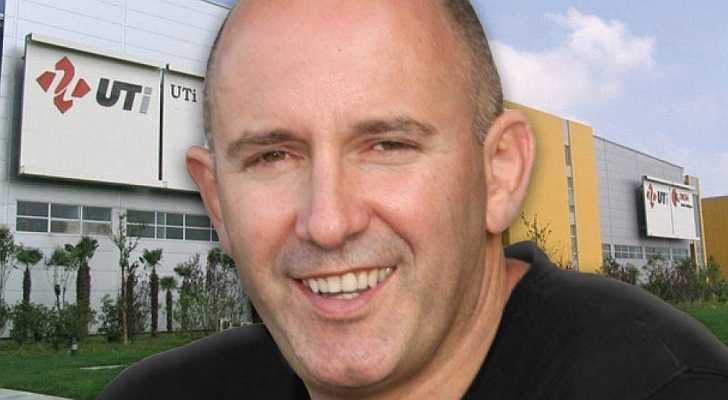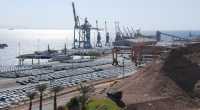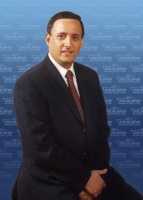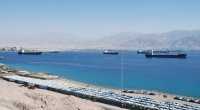Special interview with Motti Levin, who came to UTi Logistics Israel from the Maman Group with vast experience and a grasp of the concept of team management, which has already left its mark on the Israeli sphere of logistics. There is a graph hanging on the wall of his office which outlines the new management structure towards which UTi is now moving - a hint of the very deep organizational change the company is undergoing these days. But not only that.
Relative to other global logistics networks, the high-ranking UTi Worldwide is a young company in the field, with only 18 years of operation under its belt… and it started in a most unexpected corner of the world: South Africa. However, with a significant strategy of mergers and acquisitions, the company has reached mammoth proportions. The network, whose headquarters are today located in Long Beach, California, operates in about 290 cities in over 60 countries, with some 200 logistics centers and annual revenue of 4.5 billion dollars.
The group is active in all industries, including: automotive, defense, retail, chemicals, heavy industry, hi-tech and communications. From a study of well-known companies which are publicly traded (on NASDAQ) it can be learned that UTi Worldwide is typified by its balanced division among different types of clients, without being dependent on any one industry. As a result the firm has almost similarly divided sales among the various continents.
We were first exposed to UTi Worldwide at the end of April, 2007 upon the completion of one most important mergers and acquisitions in the branch of shipping and logistics in Israel. Over a relatively short span of time, the logistics giant UTi Worldwide acquired a string of Israeli logistics firms - Eilat Overseas, Newlog, Excel-Mapal, and Transclal – and created UTi Israel, which immediately became one of the three largest logistics and forwarding companies in the country.
There are over 21,000 people working in the world-wide organization, with about 900 of them in Israel, of whom 400 work in the field of forwarding and customs brokerage. The rest primarily do manpower logistics either at the sites of the subsidiary UTi-MPL, which provides third party logistics (TPL), or at the hundreds of on-site locations which the company manages for clients in a variety of businesses, including hi-tech, automotive, computers, military industry and retailers.
UTI Israel enjoys a unique standing in the worldwide network. The parent company deals mainly in forwarding and logistics; however the number of customs brokerage files handled by UTI Israel is the greatest of all the subsidiaries of UTi Worldwide!
How? we asked. Motti Levin answered:
“The reason is mainly due to the evolution of the industry in Israel in general and of UTI Israel in particular. The company was created through the merger of two of the oldest and leading agencies in the logistics marketplace in Israel: Newlog and Transclal. Newlog itself was formed via a merger of three customs brokerage firms (‘The Israel International Forwarding Company’, ‘Yamit Albany’ and ‘Daphne Weissman and Lavie’) so that in fact UTi Israel evolved over the years from more than a few mergers of customs brokers while also developing the area of forwarding. UTi Israel employs the best people in the industry of customs brokerage, and that is how we became a symbol for all business related to customs brokerage, not only in the local marketplace, but throughout the network.
“The beauty is that the Israeli importer or exporter who works with UTi knows that he is supported by a global network whose expertise is in the field of forwarding and management of supply chains. And since in Israel customs brokerage is of particular importance, the client benefits from the local expertise which UTi Israel has garnered over the years.”
Q. You came to UTi, and what did you find?
A. I started my role at UTi at the beginning of March 2011, after a long and varied professional career which included functions in both industry and in services. I came from the management of the Maman Group, and before that I managed the firm of ’Arava’. Previously I was CFO at ‘Netafim’ and ‘Israel Chemicals’. My current position closes the circle, as UTi is a supplier to Israel Chemicals and the forwarder for the entire group. At UTi I found a company which was typified by its veteran staff, who were very professional and very loyal. While UTi Israel is a relatively new brand name, the evolution of UTi in Israel resulted in the company’s employing veteran employees with much professional experience, and thus maintains a certain maturity which typifies the established companies in the field. One of our greatest challenges is how to sensitively manage the merger of these various groups of employees.
Q. And what about the workers'? Some came from Newlog, others from Transclal…
A. I discovered that the workers were under different work contracts. In fact, we are the only forwarding company, to the best of my knowledge, which is unionized and which has a workers' committee.
Q. And how do you manage with this?
A. ( Motti laughs) “There was also a workers' Union at Maman. I don’t see a problem with that. From my standpoint when there are worker reps…you have with whom to talk. All in all, it is easier to communicate with reasonable worker representatives who are loyal to the company and dedicated to the employees whom they represent. Herzl Edlan, who is the head of the UTi Workers’ Union, like Dudu Himmelfarb, Head of the Workers Union at Maman with whom I worked in my previous employment, is an intelligent person. He understands the great and joint responsibility we share and which lies before us. As I am not a MD who is disconnected and distant from my employees, in both cases I have found that Workers' Union are true partners even during the hard times of worldwide recession.”
Q. We know the facts that you describe from your days at Maman. How are such relationships effected at UTi?
A. “When I assumed this position we renewed the collective agreement and we very much appreciate the agreement with the Workers' Union, and feel that the relationship is mutual. Over the past six months we have invested a great deal for employee welfare, even though there was no specific demand from the union. We hired Iris Harel, a professional and experienced woman in human resources to serve as Vice President of Human Resources and Administration. We hired a Manager of Training and Welfare, and we started a tradition of employee affairs which last until the early hours of the morning…”
Speaking the UTi Language
Motti Levin’s office is very modest. The walls of the room are decorated with memorabilia of his previous positions: a plaque of appreciation from the Maman Workers' Union, a Certificate of Excellence in Labor Relations which he received from the National Union and, much to our surprise, in a corner of the room we found and old and faded article which Motti had framed and hung on the wall about the Swiss marathon runner, Alexandra Scheiss, who will be remembered as the person who completed the marathon at the 1984 Olympic Games in Los Angeles under great difficulty. To my question as to his interpretation for cutting out of this picture from the newspaper he responded: “The daring and persistence displayed by Scheiss speak to me and substantiate for me the example that with faith and focus on the goal one can achieve almost anything.” He immediately returned to the question in hand: “Then we renewed the collective agreement and immediately thereafter we started to ‘light the tribal fire’ around the brand called UTi. As stated, the company is the result of a number of mergers and is an international newcomer.
"We do a great deal in the area of management, where we work to strengthen a unified identity, as well as to standardize procedures, as we understand that at the end there is a client who will benefit from the added value and service that a local company tied to an international organization can offer. Naturally, immediate unification in all areas is unrealistic, but we set the objective and establish the procedure, and the goal is very, very clear. We call this ‘I’m UTi’, and that is our marathon".
Q. What problems did you identify when you came into this position?
A. I understood that we had to create the same organization identity as UTi, and to do that we had to deal with internal organizational communication.
Q. Internal organizational communication?
A. “One of the objectives we set was to set up a direct line of communications with the employees – so far as possible. One example of this is the establishment of ‘round table’ forums which I head and which we carry out every two-three weeks. We gather together 15 to 20 employees, who are selected randomly from branches throughout Israel, from across-the-border offices, from the seaports, from the airport, from MPL sites, and of course from the headquarters in Lod. People come, make suggestions, ask questions and I respond as best as I can on the spot. Within two days we publish a protocol of the forum with an addendum of a list of tasks, and this is distributed to all company employees. The company is very widespread, even geographically, and sometimes at the same ‘round table’ there are people who have spoken to each and established relationships over the telephone for years, but who are meeting in person for the first time.
"Many good things result from these forums. -things which come from the employees. When I state that a company can be a positive experience – it has to be based on communication, and so we are very strict to maintain this avenue. (Levin interrupts here in order to hold a conversation in Russian with a cleaning woman who has entered the room by mistake.) “Russian,” he clarifies, “is not my mother tongue. My parents did not speak Russian to me, and I was, in fact, born in Israel. But our home was always involved in Zionist activities and in immigrant absorption. Actually, I learned the language just from listening and I try to practice whenever I get the chance.”
Q. Interesting, even in creating a united organizational identity there is room for speech, is that right?
A. “Well, the best way to make UTI a leading brand which is known and respected is for the people here to speak the ‘UTi language’, and that is what we do. We put a great deal of effort into this. UTi Worldwide works under the strategy which we call ‘Client as One”. The heart of the matter is the focus on the CORE = Client – Organization – Reliability – Earnings. In short, optimization for the client – that’s our reason for being here. Therefore, we ourselves need an organizational structure which will support this objective. The organizational structure and the individuals who populate it must produce trustworthy service, and at the end we must also produce revenue and profits. That is the essence of the UTi strategy. To accomplish this, our Marketing and Human Resources Departments met and jointly put together a training program which is designed to confer and foster the principles of CORE among our employees. In addition, part of the organizational culture of the UTi family involves the identification and synchronization of the company’s expectations of its employees, and of the workers from the company. In this spirit we have recently distributed a charter to employees which outlines the structure of expectations, and this has been added to the code of ethics of UTi Worldwide. All of these examples answer the question regarding the existence and role or the organizational language.”
Q. And how does this charter from here fit in?
A. “The charter is a collection of detailed statements which are combined to establish a global code of ethics for the network, and it touches upon all parts of life: starting from relationships with fellow employees, the environment, the property, proprietary information of both the company and its clients, and even up to relationships with competitors and suppliers. The charter covers the entire world as relates to Israeli law vis-א-vis various international work agreements. There is a great deal of grey area in this world. The charter will also be part of our marketing materials – it is important that our clients, suppliers and business partners understand how we view ourselves.”
Localization within an International Network
Levin gets up and gives us a USB flash disc in the shape of a key onto which has been burned the corporate promotional film. When we ask if this gift is permitted according to the charter which he wrote, he doesn’t stumble but answers:”It’s allowed, because this is a distinct message with our corporate symbol burned in.”
Levin continues: “Our organizational structure was one of the first things which had to be told. How does it correctly support our activities? How does it reflect the market needs? As of now UTi has five profit centers: import, export, customs brokerage, the Palestinian sector where we are very active and successful, and the field of contract Logistics via our MPL subsidiary.”
Levin interrupts the interview in order to take a call from a friend - a business friend. "There is a great deal of emotion in the field of forwarding and transport and the competition for each ton is considered a matter of ‘life and death’. It is therefore highly important to maintain good relationships with the right people" Levin concludes his conversation with a smile, of course.
“I’m sorry for the interruption, but I must deviate for a moment to tell you that during this conversation we received encouraging news that we won a certain tender. I very much enjoyed the month of July when several of the managers were on vacation and I had the opportunity to work hands on with the ‘youngsters’ in the Department of Aviation Export. To actually work and be involved in the marketplace as a dealer! Amazing energy and the feeling that you’ve really earned your paycheck.”
Motti goes on to talk to us about the organizational structure and adds: “The company operates using matrix management, and therefore there are several broad functions: Marketing, Commercial, Human Resources, IT and Finance. All of these elements existed before I joined, because after all we are a subsidiary of a NASDAQ registered company as well as of Zim, which holds a 25% share of UTi Israel and which is also publicly transparent. However, as an economist and after having held positions of CFO in the past, I manage the organization according to the numbers and the indexes, in additional to the organizational structure.”
Q. How familiar were you with UTi before you joined? Did you understand what was waiting for you?
A. “When I was left Maman and selected UTi, I believed that I was familiar with UTi. It turned out I was not. The company has a clear maritime orientation, with a ratio of 80-20 for import vs. export. I very quickly learned that I really didn’t know much about UTi before I became part of the organization.”
Sentimental Relationship with Clients
“UTi is an organization that provides services, and is not a production industry, As a result, the human element weighs heavily and very often there is a deep emotional attachment between our clients and our employees – a relationship which we do not ignore. Otherwise, we probably wouldn’t have adapted to the CORE idea and implemented a training program which connects this principle down to the lowest level of employee. I gave myself a number of months to learn the ‘battle map’, as professionally I am neither a forwarder nor a customs broker. I have a no mean understanding of logistics, and terminal management and over the past several years I worked more than a bit with airlines and shipping companies. Nevertheless, there was a lot I had to fill in. Only after I felt that I was connected to the DNA of the organization did I dare to come out and do some ‘customer plowing’. My meetings with clients are generally done by visits to their offices, so that at least two days a week are devoted to traveling. But we also hold functions for key clients on a more personal basis in order to gain greater exposure with them. These events are usually limited forums, but we hold many such affairs, ensuring that they lend quality. These events serve us to deepen our relationships, to emphasize substance and even more importantly, to receive feedback regarding our CORE strategy and its assimilation.”
Motti invited us to one of the client conferences which he holds on a regular basis – each time with a different sector of clients, and asks that we focus on his marketing hat: “In addition to the conferences which we organize, we visit the clients – and that is the part I enjoy the most. One can spend the entire day on the organizational chart, on administration, and moving offices. These are all important and significant, but at some time the business has to stabilize and work like an oiled engine, and be managed by the professional functions, and my attention has to be directed to the key matter, which is the client market. The client will never ‘work like an oiled machine’. I have to be prepared at all times, and one must never take a client for granted.
“Happily, I’ve already gotten used to this mode of work. This is the eighth year that I am managing service oriented companies. It is really a state of mind. When you provide services it is different from manufacturing machinery. Each discipline has its own complexities, but to be a provider of service adds another facet of complexity, especially at the level of the MD.”
A New Central Management Location (The Heart)
UTi will very shortly be moving into a new office building. We asked Motti How will the organizational chart be affected by the new building?
A. “First of all, the entire management will be located in Lod; we will no longer be scattered among the buildings which served the companies which were acquired by UTi. The new building is located in a neighborhood of Lod with forest gardens, east of Route 40. All the key functionaries of the organization will be there except MPL, whose management is located in Airport City. The heads of Forwarding, the heads of Customs Brokerage, all the managers of the various profit centers will be located in Lod. The branches in Haifa, Ashdod, Eilat, the Sheikh Hussein Bridge, Allenby Bridge and the Arava crossing and Nitzanza will become operational branches where various functions will be performed. However, the management of those functions will be carried out at the center.”
Q. I don’t understand. Do you mean that up until now the branches were managed locally?
A. “There were instances where a certain client would be managed by a local branch for all his relevant operations. But now, every location and every employee is attached to the five profit centers or to a staff line. For example, the Haifa office has a bookkeeping section which is subordinate to our Chief Financial Officer who is located in Lod. Our principle dictates that geography doesn’t matter. We will continue to maintain the various offices. All across the sectors we have excellent personnel who are located in many places. Their physical presence at the passages along the length of the Israeli border is extremely important – for contact with the clients, for proximity to the actual cargo – and even if at times their functionality is not relevant to their location – they are there. By means of the Internet, by telephone, by the computer system, people get used to working, but there is constant contact and there is transparency, and the client benefits.”
Q. Between the lines you in fact speak of a deep reorganization from the root…
A. "Reorganization is a high-sounding word. I am talking about creating accountability. I gave an example of bookkeepers who sit in Haifa, but this is correct even in vertical operational areas such as the reporting of the Aviation Import Department at Ben Gurion Airport to the Vice President of Imports, something which was not clear in the past. All in all the systems worked in synchronization but not, in my opinion, in a manner which brought optimal maximization of potential. In short, one must assure that, even accounting for the constraints of location, professional responsibility exists.
"The move to the new offices is a commitment to reality. It part of the process of getting the company in harmony. It is much easier to create a single identity and reduce differences between groups of employees when all of them are located in one place. To sit in the Transclal building, near the Newlog building, just perpetuates Transclal and Newlog. The new building will be entirely branded as UTi.
A Mirror into the Micro Economics of Israel
Q. How do you think it would be possible to move the company even further ahead?
A. “In addition to UTi’s having a great sea-span, I found out that she also has an import span. Therefore, one of the things which are most important to us is to advance our exports and to bring greater balance to match the facts of the micro economics of Israel. In Israel it is customary; to say that the ratio between import to export is 40-60. I would like to achieve this 40-60 ratio at UTi as well, given the simple fact that the company is considered one of the three largest in the country. In a balanced state all the wheels of this locomotive are sitting on the tracks and the locomotive does not lean to one side. That is the goal.
“There is of course no intention to brake the growth of imports – quite the opposite, but we have to double or triple exports. This is not a trivial task, certainly not in the current economic situation.”
Q. And how can this change be done?
A. “First of all the organization chart has to be made measurable. Then you ensure that you have the right people managing those systems. Even here we have almost completed the task. All in all, the key here are the people.”
Q. So among other things you also built a new team…
A. “Company management consists largely of people who grew in the system and who were promoted to management level. Two broad functions, Human Resources and Marketing and Sales, were staffed by external recruiting. And in places where there was excess personnel or where there was no fit – those people did not remain with us. I believe that we will get to the point where we have a team that knows how to ‘dance the dance’. Among other things we also established a management forum called ‘The Ilan Forum’ which includes some 120 management men and women, and this forum will meet for the first time in the near future. Not all are team managers, some are managers of disciplines.”
Q. But nevertheless, how does one increase exports?
A. “To speak of strengthening exports, with the background of an economy that is wading, ramps and platforms which are depleted at Ben Gurion Airport and at the seaports, that is a very serious goal. I could say that in comparison with the data from last year, for the months of July and August our sales personnel achieved an impressive growth in aviation export. The secret is in the quality of the personnel, in the sharpening of the interface and the expending of energy by the staff.”
Q. As we are not talking about creating something out of nothing, we are actually talking about taking a share from the competitors. How can the productivity be increased?
A. “As I’ve said. Put the right people in the places where they are most suited, sharpen the work procedures and immediately you will get renewed passion from the employees. People run faster, they are more focused on the goals, they experience a greater sense of belonging. When I elected to come to UTi, it was important for me to come to a place where visible results for the efforts and actions would be rapid. I was not surprised. I knew that the people at UTi had it, and since I enjoy the task of taking apart and reconstruction, I understood that this was an opportunity for me.”
Q. Tell us about your activities in the Palestinian sector.
A. “Etti Idel, who was the CFO at Transclal, identified the potential of the Palestinian sector. She then started to develop this area, and she and I together are now involved in building it up. This unit, which is an independent profit center, is a complex of individuals who are familiar with the mentality and who are able to communicate with those clients. We find that most of the business people in the segment have outstanding business orientation. They also know how to identify what it is that they want, and they are willing to pay for quality work. They are very loyal clients and we are very pleased to have a strong presence in this sector.”
Q. Does UTi Worldwide have a strong presence in Arab countries?
A. “UTi Worldwide is active in our neighboring countries, such as Egypt, Jordan and Dubai. This displays the advantage of an international network. If one does not have a direct local presence, a temporary representative of sorts fills in and the clients pay for the lack of synchronization.
“We have a large number of clients who themselves have branches throughout the world. There are also Israeli exporters who are active globally, and we have to create this matching for them. Recently a textile manufacturer in Israel approached me with a problem in Europe and asked for a solution. We resolved the problem with the assistance of a sister company in Germany.”
Q. How important is Israel to UTi Worldwide?
A. “Thank you for the question! The investment in Israel is listed on the UTI books in the millions. This shows outstanding faith. I am familiar with another international network who found a partner in Israel, but in actuality she acquired only the forwarding activities of the local partner. In our case, the whole chain was included. We at UTi Israel have a grasp on all the ends of the chain of supply, and in addition we belong to an international network.”
Q. Have the investors already recouped their investment in Israel?
A. UTI came to Israel for the long term. The network has faith in the Israeli economy, in the Israeli hi-tech, in our heavy industry and our military industries, and want to be a participant in this party, to give efficient and profitable service – and that will make them happy.”
Lighting Up the Party
“I admit,” Levin says, “that it is not simple for a network which over the years has become used to working in a certain way to undergo a change. At times a certain employee might feel that I am trampling on his position. Nonetheless, the general feedback that I am receiving, both from employees and from clients, is very strong and positive. But the credit is not only mine. Along with the promotion to management level of excellent veteran employees such as Yoram Margalit, Etti Idel, Haim Shimoni, Mazi Gross and Alisa Maman, we were joined by Iris Harel, Vice President of Human Resources and Administration who came from the world of hi-tech, and Osi Tager, Vice President of Marketing and Sales with a broad background in the logistics industry, both in practice and in forwarding itself. So it is not the actions of one man alone. If one takes into account all the changes the company has undergone over the past half year, it has produced here a company and environment which are quite happy.
“When I introduced the new organizational structure at the end of May, I gathered together the people who are today part of ‘The Ilan Forum’, the round-table for managers which I referred to earlier. Among other things I screened a short film which I downloaded from YouTube entitled ‘Shirtless Dancing Guy’. In it you see a young man who doesn’t have rhythm who dances strangely and without a shirt to the musical resonance at the rock festival. And then something amazing happens: The young man is able to pull in ‘believer’, a follower- another young man who also begins to dance and then others are pulled in. A few minutes later everyone at the party is dancing in a crazy way. The film deals with leadership. There is an axis which passes through the leader -the crazy and isolated one - to the believer who follows after him, to where this is a total movement behind him. From my own point of view, at UTi I found believers who were here and who were waiting for a change. That’s not to say the work is completed.
"There is still a great deal to do, but the direction is wonderful and when one sees the development of the exports at UTi, and one sees what is happening in the Palestinian sector, and when one sees the stability in the area of imports despite the complex economic conditions, you have to say ‘wow’. Sometimes all it takes is a balance between the people, a small spark, and suddenly the business lights up. That will be a beautiful party!”





